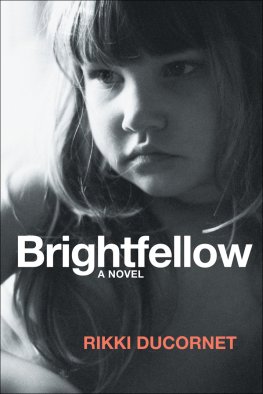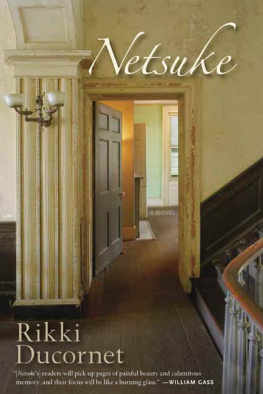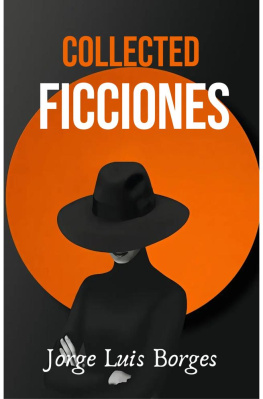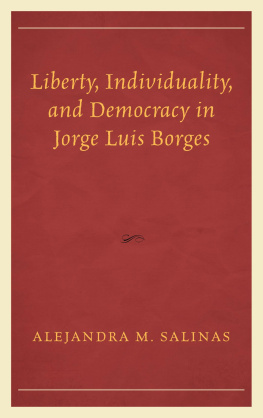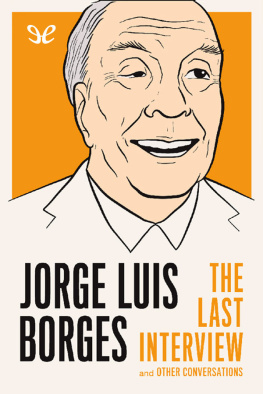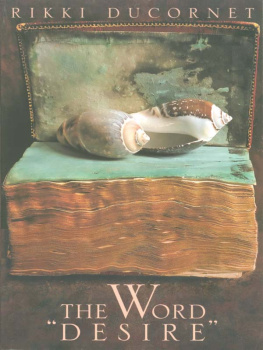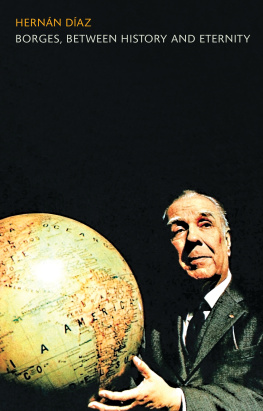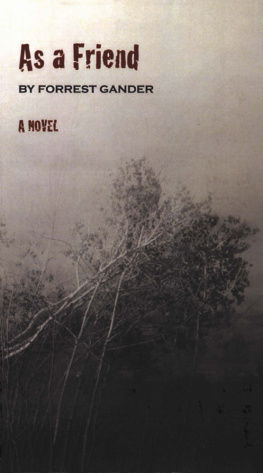Rikki Ducornet
Brightfellow
For the Lannans, the month
at Marfa where this book
begins. For my son, his creative
spirit, his courage.
I was off and not a soul was aware. For it appeared to all that I was still among them, upon my little bed, rapt in childs play.
Patti Smith, Woolgathering
THE LINOLEUM SWELLS WITH STORIES. As he plays, darkness rises from the floor and slowly claims the room. Outside, a heavy rain falls and then it ends. Outside, the world spins, and he is the only one alone.
He cautiously steps from one island to the next. Cautiously! His feet are bare and small. Sometimes he considers them with curiosity. He doesnt know hes beautiful. He doesnt know hes lonely and that his fear is not of his making, that it will haunt him for the rest of his life. It will impede him years from now twist and turn him just as an incessant wind twists and turns a tree just as it will in unexpected ways nourish him. Yes: it will both nourish and impede him. And this is a terrible thing. How can he undo such a tangle?
The damage, already there, is subtle. As is its progress. It reaches for the future like smoke. The world bends beneath the weight of such malfeasance. There is a smell to it, a flavor and a mood, a familiar weather. Although he is six, only six! he is accustomed to it. It is the atmosphere that sustains his tirelessly imagining mind. Oh! How tirelessly he dreams! He cannot know it, but already he yearns to live richly. That is to say deeply and with excitement. He is thirsty but it does not occur to him to drink.
To begin: it is late in the day. Early evening. And he is alone. He is a good child, far too good for his own safety. The house is in shadow, the woods beyond in shadow, and behind his door, the familiar rooms all are in shadow. One day the word penumbra will appeal to him. But he is too small now to know it. He plays at explorer. It is his way of claiming and knowing those charmed islands that burn so brightly in his mind. Here, he says, his head tilted to one side, are antelopes. (Antelopea word he loves.) Parrots in the trees. Parrots with beaks made to crack nuts, and with wings strong enough to master hurricanes. He draws a breath, and crossing over to the next island, the island of elephants, blows it out. Trumpeting elephants, their toes fused together. And snakes! Even more beautiful than the garter snakes that live in the backyard where the sumac grows. More beautiful than the copperheads that rule the woods where he walks sweeping the paths with a stick just as if they were planted with explosives. Poised on one foot he says: Be careful. Again he dares confront the linoleums treacherous waters. Giraffes, he nods, greeting them, coming to rest. Solidly planted and still, he looks at the world around him. The islands are all alike, gold-colored blossoms floating on an indigo sea. Volcanic islands with lakes, caves, quicksand. How he loves these islands! These epic journeys!
There is an archipelago that begins under his bed and goes all the way to his door. It shines with beauty and danger. There are flowers that have voices and sing to children. There is a poisonous toad that speaks in riddles, and the wrong sort of snake, thick as a chimney, concealed in the dappled light. Beyond the door is the bathroom he needs to visit but dares not, as well as the kitchen, his parents mysterious bedroom (a place of disquiet), the living room, the small dining room where he likes to draw pictures because the table is so big his crayons cant roll all the way to the edge and fall to the floor. Crayons, he thinks, are like baby snakes in rigor mortis (his mothers words).
But the linoleum. Its risky. If he continues this way, naming the mountains and the animals, he might wander too far, might not find his way home. The sea is black, the islands dimmer by the second. The yard outside, every room in the house, have surrendered to a night lit, but barely, by a moon broken in half.
Island by island he must step to the light switch and turn it on, but its so dark he can barely see where he is going. He might take a wrong turn and tumble onto a star headed for Mars. He really needs to pull himself together now and make his way to the light switch. And the bathroom after.
A car passes, briefly filling the room with light. The light is like an eye searching him out. But he has been good, hasnt he? There is no reason to be afraid. The switch is within reach when he stumbles and with a cry falls to his knees. He touches the floor. Dry land!
A door slams, his mothers voice calls his name. When he reaches the light the first thing he sees is the doors little brass head. He thinks that the doorknob must be the doors head even if it is in a funny place. And it has his face.
Sometimes when he is alone in the house he hears voices, her voice, so he is not certain it is her voice now. Or if the steps coming down the hall toward him are hers. Or who she will be, his mother or the one he dare not name. Stub? she calls out from the hallway, Stub? The little face on the door turns; he watches it turning and shes there, his mother, bending to hug him, saying: Poor little fellow in the dark, dark house all alone!

She dispels the shadows, all of them; it is astonishing, the radical shift that takes place: the world is back on tracka thing she likes to say. Back on track for now and maybe forever. And there will be Chinese noodles. The boxes are on the kitchen counter, and a hard head of lettuce, the sharp kitchen knife, the green and white crockery from Mexico. When shes in a good mood she says: Lets put some crunchy crackers on the crockery and chow down. And he will laugh; he will be one with laughter. If you could peel him like an orange you would find laughter all the way through. (This is how it should be; why isnt it always like this? Chinese noodles and crackers and crockery and caresses and laughter from the top of his head to the tips of his toes.)
She is so beautiful he wishes he could scramble onto her lap, but shes leaning over the kitchen table with the green and white dishes painted with leaves, so round and pretty they make him glad, like a cat that has had its milk. Or a tree in the early morning full of singing birds. This is what her magic does to him, her white magic.
His mother has a radio show. It is strange and maybe wonderful how she fits inside the little brown box. His mother, her square face, her round bottom, her funny hair, her wool suit, her high-heeled shoes, her entire brain and voice, her tongue and teeth, her laughter and her shouting it all fits in there like a slice of bread in a toaster.
There is a thing he knows: food made with love is hot. Scorching when it went into the white paper boxes, the food is still hot. Tonight his mother is a good fairy, her eyes sparkling behind her glasses. She looks nice and talks easily about the mysterious world she visits when she is across the river in Kahontsi. He relishes time with her. In the morning she will leave for work dressed in tweed. A silly word like Tweedledee. When he thinks of tweed, he imagines his mother going to Kahontsi on roller skates. But instead, off she bustles in her little leather pumps, her frizzed hair tight on her head, makeup served upon her face like a fried egg on a plate, and he is overcome with admiration and disdain.
Her face is much better in the morning before she paints it. There are little creases beside her blue eyes and a blue mole on her upper lip. Her skin is soft, not sticky. Saturday and Sunday she is lazy; the mornings unspool languorously. The house smells of coffee. When his father is home it smells of bacon and eggs and French toast, and Stub doesnt notice that the linoleum shuts down and stays that way, its secret life silenced. Silenced, too, her sudden anger that pummels him like a black rain.

